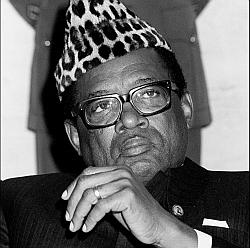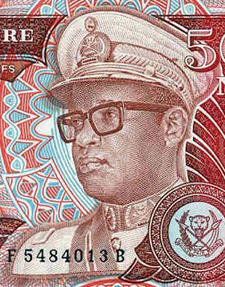|
|
Mobutu Sésé Seko Nkuku wa za Banga (or Mobutu Sese Seko Koko Ngbendu Wa Za Banga; October 14, 1930 – September 7, 1997) was the President of Zaire (now the Democratic Republic of the Congo) from 1965 to 1997.
| Contents |
Early years
Mobutu was born Joseph-Désiré Mobutu in Lisala, Belgian Congo. He joined the Force Publique, the Belgian Protestant Congolese army in 1949, rising to the rank of Sergeant Major. He left in 1956 and worked as a journalist and then newspaper editor. In 1958 he joined the nationalist Mouvement National Congolais (MNC). Following the granting of independence on June 30, 1960, he joined the new government as Secretary of the State for Defense. The new government was a coalition between Prime Minister Patrice Lumumba and President Joseph Kasavubu, both of whom soon started to struggle for overall power - both attempting to dismiss the other from government. On September 14, 1960 a coup d'état overthrew Lumumba in support of Kasavubu. Colonel Mobutu was a key figure in the coup and was rewarded with rapid promotion.
Military coup
In 1965, now Lieutenant-General Mobutu seized power from President Kasavubu, following another power struggle between Kasavubu and his prime minister Moise Tshombe. Mobutu declared himself president for five years. He quickly centralized power, put down an attempted coup in 1967 and was elected president in 1970. Embarking on a campaign of anti-European, pro-African cultural awareness, Mobutu renamed the country the Republic of Zaire in October 1971. In 1972 he renamed himself Mobutu Sese Seko Nkuku Wa Za Banga ("The all-powerful warrior who, because of his endurance and inflexible will to win, will go from conquest to conquest, leaving fire in his wake"), Mobutu Sese Seko for short (pronounced Mobootu Sese Seko). Note that the latter portion of this name has been transliterated in a wide variety of ways.
Kleptocracy
Initially he nationalized foreign-owned firms and forced European investors out of the country. This precipitated such an economic slump that Mobutu was forced by 1977 to try to woo foreign investors back. Also in 1977 he needed Belgian aid to help repulse an attack on Katanga by Katangan rebels based in Angola. Despite this, he was re-elected in 1977, but no other candidates stood. He worked hard on little but to increase his personal fortune, which in 1984 was estimated to amount to nearly US $4 billion, most of it in Swiss banks. This was almost equivalent to the country's foreign debt at the time, and by 1989 the government was forced to default on international loans from Belgium. Mobutu's rule earned a reputation as one of the world's foremost examples of kleptocracy.
Coalition government
In May 1990, due to economic problems and domestic unrest, Mobutu agreed to end the ban on other political parties and appointed a transitional government that would lead to promised elections, but he retained substantial powers. However, following riots in Kinshasa by unpaid soldiers, Mobutu brought opposition figures into a coalition government, but he still connived to retain control of the security services and important ministries. Factional divisions led to the creation of two governments in 1993, one pro and one anti-Mobutu. The anti-Mobutu government was headed by Laurent Monsengwo and Étienne Tshisekedi of the UDPS. The economic situation was still dreadful, and in 1994 the two groups joined as the High Council of Republic - Parliament of Transition (HCR-PT). Mobutu appointed Kengo Wa Dondo, an advocate of austerity and free-market reforms, as prime minister. Mobutu was becoming increasingly physically frail and during one of his absences for medical treatment in Europe, Tutsis captured much of eastern Zaire.
Overthrow
Tutsis had long opposed Mobutu due to his open support for Rwandan Hutu extremists responsible for the Rwandan genocide in 1994. When his government issued an order in November 1996 forcing Tutsis to leave Zaire on penalty of death, they erupted in rebellion. From eastern Zaire, with the support of president Paul Kagame of Rwanda, they launched an offensive to overthrow Mobutu, joining forces with locals opposed to him as they marched west toward Kinshasa. Resistance crumbled in front of the march, the army being more used to suppressing civilians than defending the large country. On May 16, 1997, following failed peace talks, the Tutsi rebels and other anti-Mobutu groups as the Alliance des Forces Democratiques pour la Liberation du Congo-Zaire (AFDL) captured Kinshasa. Zaire was renamed the Democratic Republic of Congo. Mobutu went into temporary exile in Togo but lived mostly in Morocco. Laurent-Désiré Kabila became the new president in the same day.
Death
Mobutu died in September 1997 in exile in Rabat, Morocco, from prostate cancer which had been developing since 1962.
Reference, external links
- Sandbrook, Richard (1985). The Politics of Africa's Economic Stagnation. Cambridge University Press. ISBN 0-521-31961-7.
- Wrong, Michela. "In The Footsteps of Mr.Kurtz". Perennial. ISBN 0-06-093443-3
- CNN article on recovery of Mobutu fortune (http://www.cnn.com/WORLD/9706/03/mobutu/)
- Note on his name (http://www.plexoft.com/SBF/N04.html#Sese)de:Mobutu Sese Seko
fr:Mobutu Sese Seko id:Mobutu Sese Seko ja:モブツ・セセ・セコ lt:Mobutu Sésé Seko nl:Mobutu Sese Seko sv:Mobutu Sese Seko


